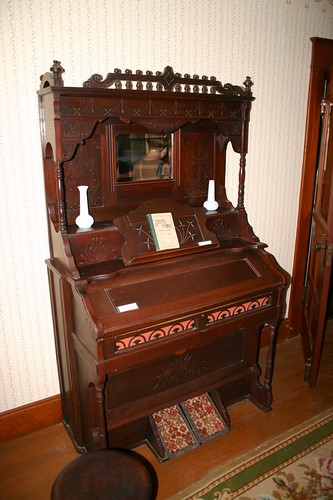Wow — tonight was thrilling. It’s hard to explain why, but it’s pretty exciting to have a radio setup that is all wrong in so many ways work well enough for me to sit in my kitchen in Kansas and talk to someone in Indianapolis using only two-way HF radios.
I recently passed my technician and general amateur radio exams. I’ve been talking to some very nice people locally on the 2m band, which permits local (say, 100-200mi radius) communication. It’s been fun, but Kansas is sparsely populated enough that sometimes there just isn’t any activity. At all.
Earlier this week, my Yaesu FT-857D and two antennas arrived. I tried it first on VHF, and had a nice chat with Kent (KB0RWI) a few miles away. But tonight was the big experiment.
I bought a 20m dipole antenna. This is basically a 30-foot-long wire, connected to a balun and a coax feed line in the middle. You’re supposed to put it at least 30 feet off the ground, and away from trees, houses, etc. You’re supposed to have a nice RF ground for your transmitter, power supply, antenna tuner, and all that stuff. You’re not supposed to just run the coax under that (until today, annoying) small hole in the seal under the kitchen storm door. You’re supposed to have to have the correct connectors on your coax, instead of soldering an RG-8 PL-259 onto some RG-8X because you’re new at this and didn’t realize that you need to buy an adapter.
And, I’m really pretty sure that you’re not supposed to have an aggressive outdoor cat — complete with a full set of claws and teeth — attack the coax RG-8X cable as it’s being pulled through the grass.
Fail to do any of these things, and the thing might not work well, or might not work at all, or for people that use old equipment, might burn out your radio or something.
So anyway I got out the ladder today, and I got the antenna maybe 10-15 feet in the air. I have three trees in a row with the perfect separation to hang each end and the center balun from. So while Jacob went around playing with water and trying out the ladder on occasion (with my help), I used some string to hang the antenna. In the trees, not far from them. Near the house. Not 30ft off the ground.
I strung the feed line into the house, set up all my equipment on our kitchen table, flipped the switch. And — nothing. Just the occasional familiar whine while tuning. I tried the 20m band, then the 40m, then even 15, 12, and 10. No activity anywhere. So what was wrong?
I improvised some grounding — extracted the ground conductor from an old strip of AC house wiring, shoved it into the ground, and grounded the tuner and transmitter. No difference.
I unplugged the coax, and tested it with my multimeter. It tested out OK.
I plugged it back in and wiggled the connector. Turns out the connector isn’t in great shape, but it had been working.
I tried transmitting. The tuner made a whole bunch of alarming-sounding clicking noises (sounded like a symphony of relays), indicated SWR over 3, and the ammeter on my power supply went a bit nuts. Later I realized that I just wasn’t giving the tuner enough time to tune up; with a few more seconds, it tuned up just fine on every frequency. (So yes, it was supposed to do that.)
And, it turns out, that all I needed to do was wait a little while longer to hear some signals. Pretty soon I was finding stuff all over the 40m band. I heard a discussion from Chicago, another from Oklahoma City, some apparent broadcasters from Africa.
I decided I would try and transmit. I was hearing one side of a discussion very clearly and decided I would wait for an opportunity to try to contact that person. I heard his callsign, K9RM. I looked it up, and realized he was near Indianapolis, where I had lived for awhile.
Eventually he invited a station trying to get in to participate. And:
“KD0MJT” (I announced my callsign, as a request to join the conversation)
He said he only made out the 0, but eventually we were talking quite well. It was a brief conversation, but interesting; the person he was talking to was in Portland, and couldn’t hear me (and I could barely hear him, but not loud enough to make out).
That with no phone lines, no Internet provider needed, etc. And with a rig that is far from being at peak efficiency. I had no idea what to expect tonight — and was surprised that just tossing an antenna up in a tree let me talk to someone in Indiana. That’s 650 miles away. I wonder what I’ll be able to do once I get things done the right way.
This hobby is going to be fun. Many thanks to Mike_W for equipment suggestions, Kent and Dan from Newton ARC for encouragement and coming out to the house to test things, Kent for being my first ham radio contact ever (on 2m while I was using an old 1981 radio), Chuck (K9RM) for taking a few minutes to be my first HF contact, and my dad for helping plan out exterior wall penetration methods that will eliminate this coax under the kitchen door and lack of grounding business.
Jacob, by the way, still loves his radios and is starting to take an interest in mine. It wouldn’t shock me at all of he’s one of these kids that gets his technician license in the 2nd grade or something. I think he and I can do this together for a long time.
Update 11/1/2010: My callsign has changed to KR0L.
